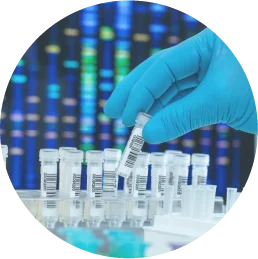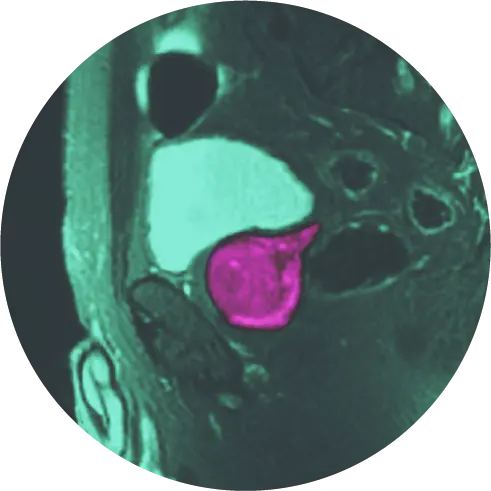When it comes to defeating prostate cancer, know thy enemy.
The quick and dirty answer to the question, “who is at risk for prostate cancer?” is this: every man on the planet. Are you a man reading this? Then you are at risk for prostate cancer. It’s the second most common and lethal form of cancer affecting men in the US. One in eight men this year will be diagnosed with the disease. There are 3.1 million American men living with prostate cancer right now. It’s incredibly common. That’s the bad news.
But here’s the good news – prostate cancer treatment today is not what it was back in your father’s or grandfather’s day. Screening, diagnostic, and treatment methods have evolved tremendously over the past few decades. Today, men have so many more options that are far less invasive than the one-size-fits-all treatments of the past. So many options in fact, that more than 98% of men diagnosed with prostate cancer will survive at least 5 years if the disease is caught and treated early.
That last part is key – “caught and treated early.” If we’ve learned anything, it’s that early detection saves lives. Thanks to the introduction of advanced, next-generation technology like prostate MRI scans, MRI-guided biopsies, and more biomarker and genetic tests than ever before, men can get the targeted diagnosis and personalized, minimally invasive treatment they need with a much lower risk of side effects.
The movement to make medicine personal is not only saving lives, but also holding families, friends, and relationships together. It’s amazing how one person’s self-awareness and accountability can affect so many other people.
That’s not reverse psychology or some other psychobabble. It’s the truth. When you take care of yourself, you can then take care of others. The key is awareness. If you’re a man growing older and looking to take stock of your prostate health, start with a simple risk assessment. Ask yourself the following questions:
Do you have difficulty urinating?
Believe it or not, if we did not perform screening for prostate cancer, the most common first symptom of prostate cancer would be bone painnot difficulty urinating. In the vast majority of patients, difficulty urinating has nothing to do with prostate cancer. And urinating normally does not exclude the possibility of prostate cancer. A PSA and/or high-quality prostate MRI is far more sensitive than difficulty urinating. By the way, we also treat patients with an enlarged prostate who have difficulty urinating. For more on our advanced, minimally invasive BPH treatment, click here.
Are you getting older?
You may not feel, think, or look like it (in which case kudos to you), but you are. For a man with no other risk factors, the odds of developing prostate cancer start to climb at age 50. If you are at an increased risk, it’s best to start talking to your doctor about a screening plan at age 40. If you do not have an elevated risk, start the talk at 45. Either way, it’s important to establish your personal health metrics early and when you feel “normal.” This way, you’ll have numbers with which to compare the outcomes of future tests and have a higher likelihood of catching an abnormality with routine screenings.
Do you have an elevated PSA?
A lot of guys balk at the thought of “getting their prostate checked,” but it begins with a simple blood test, called the PSA (prostate specific antigen) test. The PSA test measures the amount of a protein specific to the prostate that is circulating in your bloodstream. This simple test won’t give you all the answers, but it is a powerful screening tool and will establish a baseline level to which your doctor can compare future PSA test results. Ultimately, you should consult with your doctor when deciding on a screening plan that is best for you.
Do you have a family history of prostate cancer?
Have you ever heard family members say a certain disease “runs in the family?” It’s a phrase that sounds like some centuries-old curse. However, it’s not voodoo, nor is it always due to shared genetics. 10%-20% of all cancers are defined as “familial.” If you have one first-degree relative like a dad or brother that develops prostate cancer, your risk is two and a half times that of a man with no family history.[i] Believe it or not, there is also an overlap between prostate cancer genes and breast cancer genes. Have you heard of BRCA1 and BRCA2? Apparently, men and women do have things in common. Research shows that families with a history of prostate, ovarian, breast, colon, or pancreatic cancers on either side may share genetic mutations that make the development of certain cancers more likely.[ii]
The faulty gene(s) can be passed down from a father or a mother. If you suspect that you fall into this category, fill out the form at the bottom of this page to learn about doing a hereditary assessment. HALO Diagnostics is proud to offer genomic testing as part of our robust men’s health and wellness program.
How’s your diet and exercise routine?
Numerous studies over the past decade have proven that men who eat a lot of red meat and dairy have an increased risk of developing prostate cancer.[iii] Obesity has also been linked to an elevated risk, as well as smoking. You can reduce your risk with a healthy, more plant-based diet rich in vitamins and antioxidants, as well as by committing to an exercise routine. If you’re not an athlete, start slowly by walking every day. And if you smoke, try to quit.
If you’ve been diagnosed with prostate cancer, take the time to fully explore your options. Every man’s case of prostate cancer is unique. At HALO Diagnostics, we firmly believe that there are no one-size-fits-all treatment options. Here, we offer Focal Laser Ablation, MRI-guided prostate biopsies, and TULSA-PRO® for the diagnosis and treatment of prostate cancer and benign prostatic hyperplasia, or BPH (enlarged prostate).
To learn more about the Prostate Laser Center diagnostic and treatment program, don’t wait! Give us a call today to speak to a member of our staff: (713) 904-4014.
If you’d prefer a member of our staff to contact you, simply fill out the form below and we’ll be in touch within 1-2 business days.
Article references:
[i] https://www.cancer.org/cancer/prostate-cancer/causes-risks-prevention/risk-factors.html
[ii] Petrucelli N, Daly MB, Pal T. BRCA1- and BRCA2-Associated Hereditary Breast and Ovarian Cancer. 1998 Sep 4 [Updated 2022 Feb 3]. In: Adam MP, Ardinger HH, Pagon RA, et al., editors. GeneReviews®
[iii] Oczkowski, Michal et al. “Dietary Factors and Prostate Cancer Development, Progression, and Reduction.” Nutrients vol. 13,2 496. 3 Feb. 2021, doi:10.3390/nu13020496




